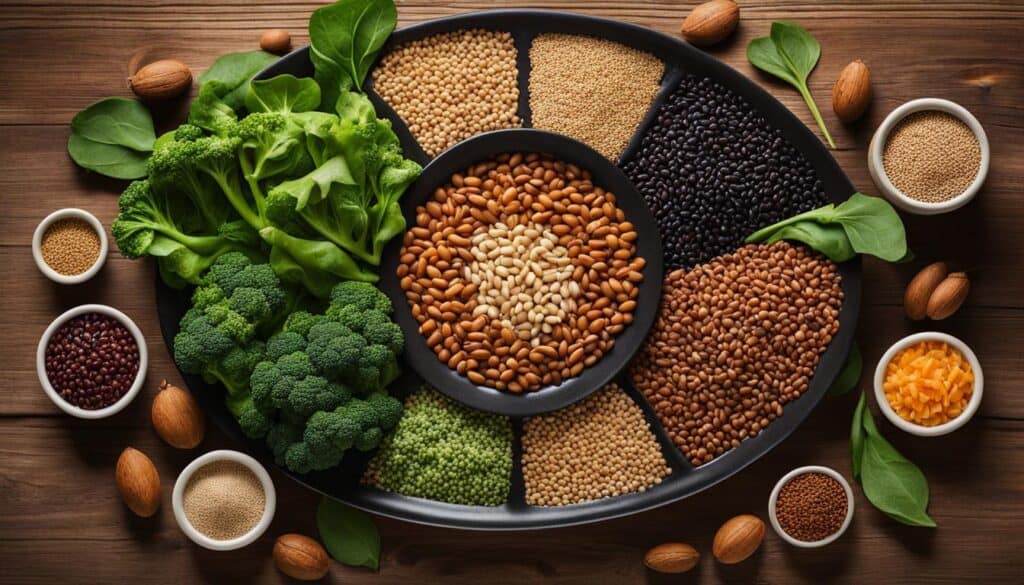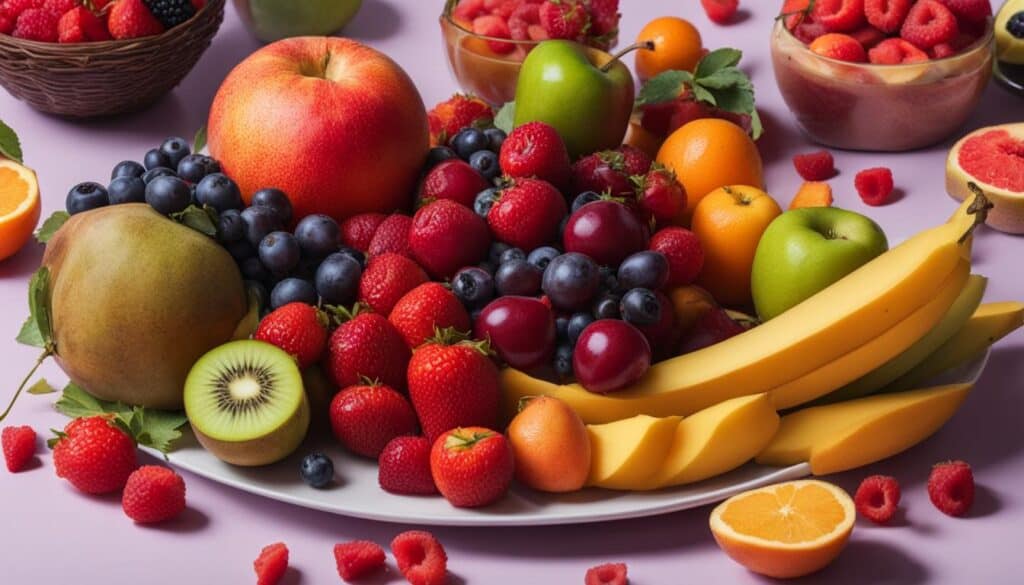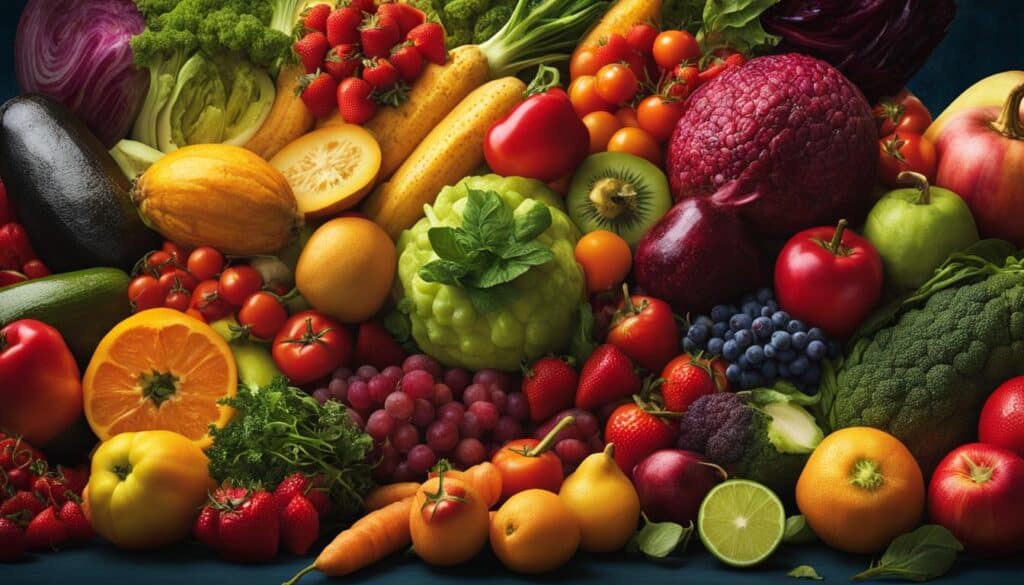Hello, I’m here to share my digestive tale and answer the burning question: does eating fruit make you poop? As a copywriting journalist, I’ve done my fair share of research on the topic and I’m excited to shed some light on the connection between fruit and bowel movements. So let’s dive in!
We all know that fruits are a vital part of a healthy diet. They are not only delicious but also loaded with essential vitamins and minerals that our bodies need. But what about their impact on our digestive system?
One key element of fruits that contributes to digestive health is dietary fiber. Fiber, found in fruits, vegetables, whole grains, and legumes, plays a crucial role in maintaining regular bowel movements and overall digestive well-being. It comes in two forms: soluble and insoluble fiber.
Soluble fiber, which dissolves in water to form a gel-like substance, has several health benefits. It helps lower cholesterol and glucose levels, making it a valuable asset in maintaining heart health and managing diabetes. Insoluble fiber, on the other hand, promotes bowel movement and stool bulk, preventing or relieving constipation.
Before making significant changes to your diet, such as increasing fiber intake, it’s important to consult with a healthcare professional to ensure it’s safe and appropriate for your individual health needs.
A diet rich in high-fiber fruits can help improve bowel regularity while providing numerous other health benefits. It’s no wonder that fiber has become a buzzworthy topic in the world of nutrition!
Key Takeaways:
- Eating fruits high in fiber can improve bowel movements and promote digestive health.
- Dietary fiber comes in two forms: soluble and insoluble fiber.
- While soluble fiber helps lower cholesterol and glucose levels, insoluble fiber promotes bowel movement and stool bulk.
- Consuming a variety of high-fiber fruits can provide other health benefits, including weight management, lower risk of disease, and even a longer lifespan.
- It’s important to listen to your body, gradually increase fiber intake, and maintain a balanced diet for optimal digestive health.
Why Fiber is Essential for a Healthy Diet
Dietary fiber is crucial for maintaining a healthy diet and promoting overall well-being. It is the indigestible part of plant foods that provides numerous health benefits. There are two types of fiber: soluble fiber and insoluble fiber.
Soluble fiber dissolves in water to form a gel-like material in the digestive system. This type of fiber is beneficial for lowering blood cholesterol and glucose levels. Foods rich in soluble fiber include oats, peas, beans, apples, citrus fruits, carrots, barley, and psyllium.
Insoluble fiber does not dissolve in water but adds bulk to the stool and promotes regular bowel movements. Great sources of insoluble fiber include whole-wheat flour, wheat bran, nuts, beans, and vegetables like cauliflower, green beans, and potatoes.
A high-fiber diet offers a range of health benefits. It helps in normalizing bowel movements, ensuring regularity, and maintaining bowel health. Additionally, fiber plays a crucial role in reducing cholesterol levels, controlling blood sugar levels, and achieving a healthy weight. Studies have also shown that a high intake of dietary fiber is associated with a longer lifespan.
To summarize, fiber is essential for a healthy diet due to its ability to normalize bowel movements, maintain bowel health, lower cholesterol levels, control blood sugar levels, aid in achieving a healthy weight, and potentially contribute to a longer life span.
How Much Fiber Do You Need?
When it comes to fiber intake, it’s important to know how much is recommended for optimal health. The Institute of Medicine provides guidelines for daily fiber recommendations for adults, and these values vary based on age and gender:
| Age Group | Recommended Fiber Intake |
|---|---|
| Men under 51 years old | 38 grams |
| Men over 51 years old | 30 grams |
| Women under 51 years old | 25 grams |
| Women over 51 years old | 21 grams |
To ensure you receive the greatest health benefits, it’s essential to incorporate a wide variety of high-fiber foods into your diet. The table below provides examples of foods rich in fiber:
| Fiber-Rich Foods |
|---|
| Fruits: Berries, apples, pears |
| Vegetables: Broccoli, carrots, Brussels sprouts |
| Legumes: Beans, lentils, chickpeas |
| Whole Grains: Oats, quinoa, brown rice |
| Nuts and Seeds: Almonds, chia seeds, flaxseeds |
By incorporating these fiber-rich foods into your daily meals and snacks, you can easily meet your recommended fiber intake and enjoy the numerous health benefits associated with a high-fiber diet.
Selecting High-Fiber Foods
When it comes to incorporating high-fiber foods into your diet, there are several excellent choices to consider. These include:
- Whole-Grain Products
- Fruits
- Vegetables
- Beans and Legumes
- Nuts and Seeds
These options are packed with essential nutrients and high levels of fiber, making them ideal for promoting a healthy digestive system. On the other hand, it’s best to limit your consumption of refined or processed foods, such as canned fruits and vegetables, non-whole-grain cereals, and white breads and pastas, as they tend to be lower in fiber.
While it may be tempting to turn to fiber supplements or fortified foods, it’s important to note that these options lack the variety of fibers, vitamins, minerals, and other nutrients found in natural, whole foods. Instead, focus on incorporating a wide range of high-fiber foods into your diet to reap the full benefits. Gradually increasing your fiber intake and ensuring you stay hydrated by drinking plenty of water is key to achieving optimal results.
To give you a better idea of the fiber content in different food choices, here’s a table that highlights some high-fiber options:
| Food | Fiber Content (per serving) |
|---|---|
| Whole-Wheat Bread | 3 grams |
| Apples (with skin) | 4 grams |
| Broccoli | 5 grams |
| Lentils | 8 grams |
| Almonds | 4 grams |
By incorporating these high-fiber foods into your diet, you can support your digestive health and overall well-being. Remember to aim for variety and moderation, and consult with a healthcare professional if you have any concerns about your fiber intake or digestive health.
How Fruits Can Improve Bowel Movements
High-fiber fruits are a natural choice to improve bowel movements due to their fiber content. Incorporating a variety of high-fiber fruits into your diet can support a healthy digestive system and promote regularity.
Berries like raspberries, blackberries, and strawberries are not only low in calories but also high in fiber. They provide numerous benefits for digestion, including improved bowel movements.
Dried fruits such as prunes, figs, and dates are not only delicious but also packed with fiber. They contain a natural laxative called sorbitol, which can help stimulate bowel movements.
Plums, pears, and apples are high in pectin, a type of fiber that aids in bowel regularity. Including these fruits in your diet can help maintain a healthy digestive system.
To visualize the fiber content in different fruits, here’s a table:
| Fruit | Fiber Content (per 100g) |
|---|---|
| Berries (raspberries, blackberries, strawberries) | 6-8g |
| Dried fruits (prunes, figs, dates) | 7-9g |
| Plums, Pears, Apples | 2-4g |

Remember to include these high-fiber fruits in appropriate portions as part of a well-balanced diet for optimal results. With their natural fiber content, these fruits can contribute to improved bowel movements and support your overall digestive health.
Other High-Fiber Foods for Digestion
In addition to fruits, there are several other high-fiber foods that can benefit your digestion. By incorporating these foods into your diet, you can support a healthy digestive system and ensure regular bowel movements. Here are some fiber-rich options to consider:
- Beans and Lentils: These legumes are packed with fiber and can be added to various dishes like salads, soups, and casseroles.
- Popcorn: Air-popped popcorn is a tasty and low-calorie snack that provides a good amount of dietary fiber. Just make sure to avoid microwave popcorn loaded with unhealthy additives!
- Whole-Grain Bread: Opt for bread made from 100% whole grains, which contains more fiber than refined white bread. Enjoy it toasted or as part of a sandwich for a wholesome fiber boost.
- Broccoli: This green vegetable is not only rich in vitamins and minerals but also packed with fiber. Enjoy it raw in salads, steamed, or roasted for a delicious and nutritious addition to your meals.
- Nuts: Almonds, pecans, and walnuts are not only flavorful and crunchy but also excellent sources of fiber. Enjoy them as a snack or sprinkle them over salads and yogurt.
- Baked Potatoes: Consuming baked potatoes with the skin provides a good amount of fiber. Top them with healthy toppings like plain Greek yogurt, salsa, or steamed vegetables for added flavor and nutrients.
- Spicy Food: While spicy foods like chili peppers can irritate the digestive tract, they can also stimulate bowel movement due to their active compounds. Just be mindful of your spice tolerance and consume them in moderation.
By incorporating these high-fiber foods into your diet, you can improve your digestion and overall health. Remember to maintain a balanced and varied diet to ensure you’re getting a wide range of nutrients along with your fiber intake.
| Food | Fiber Content (per serving) |
|---|---|
| Beans and Lentils | Varies based on type and serving size |
| Popcorn | Around 14 grams per 3 cups |
| Whole-Grain Bread | 3-4 grams per slice |
| Broccoli | 5 grams per cup (cooked) |
| Nuts | 2-4 grams per ounce (varies based on nut type) |
| Baked Potatoes | 2-4 grams per medium-sized potato (with skin) |
| Spicy Food | Varies based on the type and quantity of spices used |
Note: The fiber contents provided are approximate and may vary depending on the source and preparation method.

Including these high-fiber foods in your diet can support a healthy digestive system and regular bowel movements. However, remember to listen to your body and consult a healthcare professional if you have any persistent digestive concerns.
Foods That May Cause Diarrhea
Certain foods can trigger an urgent need to go to the restroom, potentially leading to diarrhea. It’s important to be mindful of your diet and how certain foods can affect your digestive system. Here are some common culprits:
- Coffee: Coffee, especially with caffeine, stimulates the digestive system and can cause loose stools. If you’re sensitive to coffee, consider reducing your intake or switching to decaf.
- Sugar Substitutes: Aspartame, sucralose, maltitol, and sorbitol are commonly used sugar substitutes. They may not digest properly for some people, resulting in laxative effects. Be cautious when consuming foods or drinks containing these sweeteners.
- Fast Food: Fried and greasy foods, typical of fast food, can irritate the stomach and lead to diarrhea. Opt for healthier alternatives whenever possible.
- Spicy Foods: Spicy foods can irritate the digestive tract, leading to loose stools. If you’re prone to diarrhea, it may be wise to limit your consumption of spicy dishes.
- Alcohol: Alcohol can irritate the stomach, speed up digestion, and result in watery stools. Moderate your alcohol intake to avoid potential digestive issues.
- Dairy: For individuals who are lactose intolerant, consuming dairy products can cause digestive issues, including diarrhea. Consider alternatives like lactose-free milk or dairy-free options.
- High-Fiber Fruits and Veggies: While high-fiber fruits and vegetables are beneficial for digestion, consuming excessive amounts can increase bowel movements and potentially cause diarrhea. It’s important to consume these foods in moderation.
Being aware of these food triggers can help you make informed choices and manage your digestive health effectively.

| Food | Effect on Digestive System |
|---|---|
| Coffee | Stimulates the digestive system |
| Sugar Substitutes | May not digest properly for some individuals |
| Fast Food | Irritates the stomach |
| Spicy Foods | Irritates the digestive tract |
| Alcohol | Irritates the stomach and speeds up digestion |
| Dairy | Can cause digestive issues for those who are lactose intolerant |
| High-Fiber Fruits and Veggies | May increase bowel movements if consumed in excess |
Managing Digestive Health and Bowel Movements
To effectively manage digestive health and maintain regular bowel movements, there are several essential tips to follow. These include gradually increasing fiber intake, staying hydrated, and maintaining a balanced diet with proper portion control.
One key aspect is the gradual increase of fiber intake. I recommend incorporating fiber-rich foods into your meals and snacks. Start by adding small amounts of fiber to your diet and gradually increase it over a few weeks. This method allows your digestive system to adjust without causing any discomfort or digestive issues.
Hydration is also crucial for optimal digestive health. Drinking plenty of water helps the fiber work effectively in your system. Aim to consume at least eight glasses of water per day to stay properly hydrated.
In addition, a balanced diet is essential for overall digestive health. Ensure that your meals include a variety of nutrients from different food groups. Incorporate high-fiber fruits, vegetables, whole grains, and legumes into your daily meals. Remember to have appropriate portion control, even with high-fiber foods, to prevent any potential digestive problems.
| Tips for Managing Digestive Health |
|---|
| Gradually Increase Fiber Intake |
| Stay Hydrated |
| Maintain a Balanced Diet |
| Practice Portion Control |
By following these tips, you can effectively manage your digestive health and maintain regular bowel movements. Remember to listen to your body and consult a healthcare professional if you have any persistent digestive concerns.

The Role of Dietary Fiber in Overall Health
The consumption of dietary fiber, including fruits and other fiber-rich foods, has a significant impact on our health. Numerous studies have shown that increasing our intake of dietary fiber, especially cereal fiber, can contribute to a reduced risk of cardiovascular disease and certain types of cancer.
Dietary fiber also plays a crucial role in preventing digestive diseases such as hemorrhoids, diverticular disease, and colorectal cancer. By incorporating fiber-rich foods into our balanced diet, we can support our overall health and well-being.

Health Benefits of Dietary Fiber
The potential health benefits of dietary fiber are vast. Here are some of the key ways in which dietary fiber can positively impact our well-being:
- Reduced risk of cardiovascular disease
- Lower rates of certain types of cancer
- Prevention of digestive diseases
- Improved bowel regularity
- Support for weight management
“Incorporating fiber-rich foods into our diet can have a profound effect on our overall health and longevity.”
Getting Enough Fiber in Your Diet
To harness the potential health benefits of dietary fiber, it’s crucial to ensure we are consuming enough fiber-rich foods. Here are some excellent sources of dietary fiber:
| Fiber-Rich Foods | Amount of Fiber |
|---|---|
| Fruits (e.g., berries, apples, pears) | Varies depending on the fruit, but generally a good source of fiber |
| Vegetables (e.g., broccoli, carrots, peas) | Varies depending on the vegetable, but generally a good source of fiber |
| Whole grains (e.g., oats, quinoa, brown rice) | Significant amounts of fiber |
| Legumes (e.g., lentils, chickpeas, black beans) | High in fiber |
Tips for Incorporating More Fiber into Your Diet
- Add fruits and vegetables to your meals and snacks
- Choose whole grains instead of refined grains
- Incorporate legumes into your soups, salads, and main dishes
- Replace sugary snacks with fiber-rich alternatives
- Drink plenty of water to help the fiber work effectively
By following these tips and ensuring a well-balanced diet, we can maximize the potential health benefits that dietary fiber offers. Let’s prioritize our health by including more fiber-rich foods in our daily meals.
Conclusion
In conclusion, incorporating high-fiber fruits and other fiber-rich foods into your diet can improve bowel movements, support digestive health, and contribute to overall well-being. The consumption of dietary fiber, found in fruits, vegetables, whole grains, and legumes, has been linked to various health benefits such as weight management, reduced risk of cardiovascular disease and certain cancers, and improved bowel regularity. Soluble fiber helps lower cholesterol and glucose levels, while insoluble fiber promotes bowel movement and stool bulk.
To achieve optimal results, it is important to gradually increase fiber intake, stay hydrated, and maintain a balanced diet. Incorporate fiber-rich foods into your meals and snacks, allowing your digestive system to adjust over time. Drinking plenty of water is also crucial for fiber to work effectively and prevent constipation. Additionally, practicing moderation and portion control can help manage potential digestive issues that certain foods may trigger. It is essential to listen to your body’s signals and consult a healthcare professional if you have persistent digestive concerns.
By prioritizing high-fiber fruits and other fiber-rich foods, you can support your digestive health, improve bowel movements, and enhance your overall well-being. Remember that dietary changes take time, so be patient and consistent in your efforts. With a balanced diet and a mindful approach to fiber intake, you can enjoy the benefits of a healthy digestive system and live life to the fullest.
FAQ
Does eating fruit make you poop?
Yes, eating certain fruits can improve bowel movements due to their high fiber content. Fiber promotes the movement of material through the digestive system and increases stool bulk, which helps with regularity and prevents or relieves constipation.
What are some high fiber fruits for digestion?
Some high fiber fruits that can improve digestion include berries, prunes, figs, dates, plums, pears, and apples. These fruits are rich in fiber, specifically soluble and insoluble fiber, which can promote bowel regularity.
How does fruit affect digestion?
Fruit affects digestion by providing dietary fiber, which plays a crucial role in maintaining bowel health. Soluble fiber helps lower cholesterol and blood sugar levels, while insoluble fiber promotes bowel movement and stool bulk. Eating a high-fiber diet can normalize bowel movements and improve overall digestive health.
What is the connection between fruit and bowel movements?
Fruits, especially those high in fiber, can promote bowel movements by providing the necessary roughage for efficient digestion. The fiber in fruits adds bulk to the stool, making it easier to pass through the digestive system and preventing constipation.
What fruits are good for healthy digestion?
Berries, prunes, figs, dates, plums, pears, and apples are all good fruit choices for healthy digestion. These fruits contain high amounts of fiber, which can improve bowel movements and support overall digestive health.
Are there other high-fiber foods besides fruits for digestion?
Yes, there are several other high-fiber foods that can support digestion. These include beans and lentils, whole-grain bread, popcorn, broccoli, nuts, baked potatoes, and spicy foods like chili peppers.
Can certain foods trigger diarrhea?
Yes, certain foods can trigger an urgent need to go to the restroom and potentially lead to diarrhea. These include coffee, sugar substitutes like aspartame and sorbitol, fast food, fried and greasy foods, spicy foods, alcohol, and dairy products.
How can I manage digestive health and maintain regular bowel movements?
To manage digestive health and maintain regular bowel movements, it is important to gradually increase fiber intake, stay hydrated, and maintain a balanced diet. Incorporating fiber-rich foods into meals and snacks, drinking plenty of water, and practicing portion control can help maintain optimal digestive health.
What is the role of dietary fiber in overall health?
Dietary fiber has numerous health benefits, including normalizing bowel movements, maintaining bowel health, lowering cholesterol levels, controlling blood sugar levels, aiding in weight management, and potentially contributing to a longer lifespan. Increasing dietary fiber intake has also been linked to a reduced risk of cardiovascular disease and certain cancers.
Source Links
- https://www.everydayhealth.com/digestive-health/diet/foods-that-help-relieve-constipation/
- https://www.mayoclinic.org/healthy-lifestyle/nutrition-and-healthy-eating/in-depth/fiber/art-20043983
- https://www.geisinger.org/health-and-wellness/wellness-articles/2017/10/16/20/49/7-foods-that-might-make-you-go





Leave a Reply